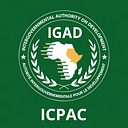ICPAC Training Boosts Media’s Role in Combating Transboundary Pests
By Emebet A. Jigssa with contributions from the IGAD Climate Change Technical Working Group

IGAD Climate Prediction and Applications Center (ICPAC) recently concluded a training workshop aimed at sensitizing major media editors in the IGAD region on the importance of timely reporting on transboundary pests. The event brought together 19 media editors, from the 7 IGAD Member States to discuss the critical role of the media in combating these threats.
Transboundary pests—such as the desert locust—pose a significant threat to the region’s agriculture, food security, and livelihoods. By enhancing the capacity of media professionals to report on these issues effectively, the training sought to improve public awareness and facilitate timely responses to outbreaks.
Participants learnt about the various impacts of transboundary pests, including their economic, social, and environmental consequences. They also gained practical skills on supporting journalists in covering these topics, such as conducting interviews, gathering data, crafting compelling narratives, and timely dissemination to their target audiences.
“IGAD understands that the media is a powerful tool for reaching the people of the region.” said Dr. Fatuma Adan, IGAD Head of Mission in Kenya.

“By providing accurate and timely information, media can help to build trust and understanding between IGAD and the communities we serve. It’s essential that the media has a clear understanding of this crucial topic, so they can effectively communicate to the public.” Dr. Fatuma added.
The training also fostered collaboration among media professionals. This networking, including establishment of a community of practice will be essential for ensuring coordinated responses to future pest outbreaks, resulting in timely information sharing.
“The media plays a crucial role in raising awareness and mobilizing action against transboundary pests by providing timely and accurate information, journalists can help to prevent transboundary pest outbreaks from escalating and causing widespread damage,” said Emily Ego, a representative from ICPAC.

As a result of the workshop, it is expected that media coverage of transboundary pests in the IGAD region will become more comprehensive, informative, and impactful. This will contribute to building resilience and safeguarding the region’s food security and livelihoods.
Participants also emphasized the importance of a proactive approach, rather than reactionary to crises.

“By being proactive, we can avoid the costly and time-consuming consequences of reactive measures. Let’s plan ahead and take steps to mitigate and foster preparedness.” said Solomon Tsegaye, the Deputy Editor-In-Chief, Amharic Desk, Ethiopian Broadcasting Corporation.
“Transboundary pests pose a significant threat to our region’s food security and livelihoods,” said Lasuba Memo, a participant from South Sudan’s Eye Radio.
“This training has given us the tools to communicate these risks to the public and advocate for timely action,” he added.

“Early warning is everything when it comes to transboundary pests” said Emily Kimathi, a climate monitoring and early warning expert from ICPAC.
She emphasized the importance of media collaboration in combating transboundary pests. “By working together, we can ensure that early warnings are disseminated effectively and that communities are prepared to respond.” she added.

The Inter-regional Platform for the Sustainable Management of Transboundary Pests serves as a collaborative hub for addressing the challenges posed by transboundary pests in the region. By fostering cooperation among member states, the platform facilitates the sharing of information, resources, and best practices for early warning, prevention, and control measures.

Media trainings are a key component of the platform’s capacity building efforts, ensuring that stakeholders have the skills to effectively communicate and raise awareness about transboundary pest threats. Through coordinated efforts, the platform aims to mitigate the negative impacts of transboundary pests on agriculture, food security, and livelihoods, ensuring a more resilient and sustainable future for the region.
